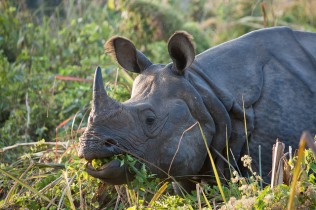There was good news from Nepal last month as the country proudly announced that absolutely no poaching had occurred in the 12-month period ending with February 2014—the second year with zero poaching. Back in 2011 Nepal also celebrated a year without poaching, and in 2012, only one rhino was poached.
Nepal has strict anti-poaching laws and has taken a variety of measures to stop poaching, including the arrest in October 2013 of a major kingpin thought to have caused the killing of 12 rhinos in the past six years. John Sellar, an anti-smuggling, fraud, and organized crime consultant and former CITES enforcement chief, told National Geographic that “Nepal’s forest law empowers district forest officers and chief wildlife wardens to deal with offenders and impose prison sentences of up to 14 or 15 years.”
“It is a huge achievement for Nepal that no rhino, tiger or elephant was killed during the last 365 days, which also shows the national-level commitment to control wildlife crimes in the country,” said Megh Bahadur Pandey, director general of Nepal’s Department of National Parks and Wildlife Conservation, according to an article by the International Union for the Conservation of Nature (IUCN).

According to the National Geographic article, the population of tigers in Nepal’s national parks has increased from 121 in 2009 to 198 in 2013. A 2011 census found that the population of one-horned rhinos has increased by 20 percent since 2008, from 425 to an estimated 534, more than 500 of them in Chitwan National Park.
This is promising news, especially in the wake of the Maoist insurgency from 1996 to 2006 when poaching increased and Chitwan, the first national park in Nepal, lost nearly half of its rhino population in just six years. At that time, there were not enough soldiers guarding the park because they were deployed elsewhere to combat the insurgency. Now that the political situation has stabilized, the government can focus more effort and resources towards protecting Nepal’s wildlife.
“There has been collaboration across the board in Nepal to stop poaching by putting more rangers on the ground in a cohesive, sophisticated way, actively enforcing anti-trafficking laws to break down illegal wildlife trade networks, educating local communities, and building a shared ethic of conservation across Nepali society,” Shubash Lohani, deputy director of the Eastern Himalaya Ecoregion Program at the World Wildlife Fund (WWF) stated in the National Geographic article.
Working with local communities is key to continued success against poaching. However, it’s not enough to tell locals that preserving wildlife is important; providing economic incentives is also essential. Tourists coming to see the rhinos in Chitwan National Park benefit local communities as well as the Nepalese government
“The government actually gives 50 cents of every tourist dollar to local communities, which makes them hold more value for rhinos alive than dead,” Lohani told National Geographic.
One-horned rhinos are some of the most endangered animals on the planet, hunted for their horns, which are used in traditional East Asian medicine. But, there is no scientific proof as to whether or not the horn actually has medicinal properties.
According to a BBC article on poaching in Nepal, anti-poaching teams use trained elephants to do large sweeps to find and arrest poachers hiding out in the park. “Sometimes we bring elephants from other parks to hold a sweeping exercise. Around 20 or 25 elephants will take part in the exercise and we will scour an entire area with bushes or tall grass looking for poachers’ dens or hide outs,” Rupak Mahajan, coordinator of anti-poaching operations in the park, told the BBC.
With sustained efforts by the government and local communities, Nepal’s success in combating poaching appears likely to continue. Conservationists and others who care about wildlife can only hope that other countries will look to Nepal’s efforts as an example of how to save their own wildlife from the dangers of poaching.
Read Ethical Traveler's Reprint Policy.
